African Studies from an underwater perspective: diving for data
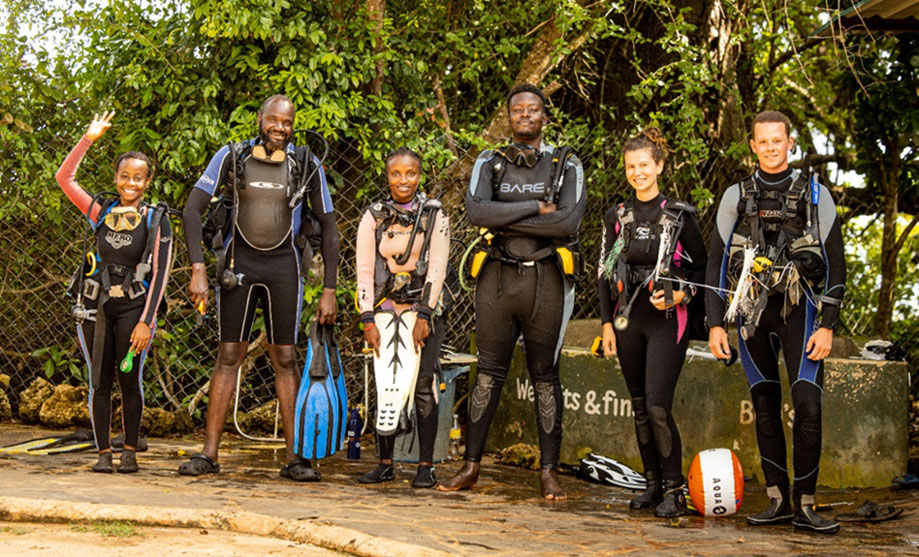

By Indy Koster, student of the Research Master African Studies at Leiden University.
This blog post appears in a series written by students or recent alumni of the Master and Research Master African Studies about their research internship or fieldwork. Their posts will appear on an irregular basis.
‘Coral for people, people for coral’ is the motto of the REEFolution foundation. This (Dutch) NGO is based in Shimoni, a coastal village in south eastern Kenya, directly across Wasini Island. The aim of REEFolution is to restore the degraded coral reefs, which is necessary since coral reefs are dying off throughout the world: over 50 percent of the world’s coral reefs have died in the last 30 years and up to 80 percent of the living corals are threatened (REEFolution website).
To turn the tide, REEFolution works together with local communities in order to actively restore and protect coral reefs in the Wasini Channel. Since the end of September 2022, I live in Shimoni and collaborate with REEFolution for my thesis research, which focuses on the social aspects of the coral reef restoration project at community-level. More specifically, I focus on how women in Shimoni and on Wasini Island perceive threats to the coral reef, and how they relate to the reef.
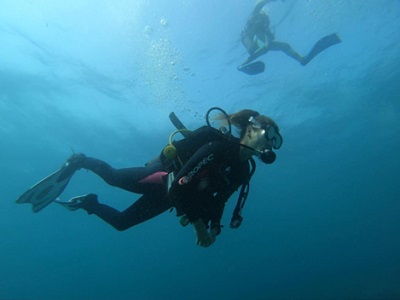 Spending time in my ‘study context’
Spending time in my ‘study context’
The reefs are under threat because of climate change, pollution, and overfishing. This is alarming, since coral reefs provide food and shelter for many important marine species that support both underwater life and life on land. Furthermore, reefs directly and indirectly provide resources to coastal communities, e.g. through coastal protection, seafood supplies and tourism opportunities.
Since the coral reef plays such an important role in my thesis research, I want to observe the condition of the reef with my own eyes. In order to do that, I choose participant observation as one of the research methods to analyse the coral reef. An important aspect of participant observation is to spend a great deal of time in a study context. Therefore, it is essential that I am often physically present in my ’study context’: underwater, close to the coral reef. Yet, I am aware that including non-anthropocentric participants in my research - which is mainly based on anthropological knowledge - is still somewhat uncommon and my approach is therefore rather exploratory.
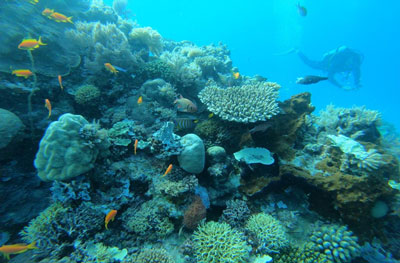
Besides observing the reef, I also try to help REEFolution with the coral restoration. Therefore, I follow the PADI (Professional Association of Diving Instructors) specialty course Coral Reef Restoration. Through this course I learn the ins and outs of coral reef restoration, such as how to clean structures, harvest coral and how to out-plant coral on artificial reefs. During my stay at REEFolution I try to dive at least once or twice per week. If costs would not play a role, I would probably try to dive every day, because all the beautiful and diverse creatures that live underwater keep fascinating me.
Not academic enough?
When I started to write my research proposal, I never thought that diving could become one of the research methods for my thesis. I still remember one of the first thesis meetings I had with my supervisor, Dr Harry Wels. It was a rainy day in April 2021 and we had a cup of coffee at the university café to discuss my thesis topic ideas. I told Dr Wels about my interest in coral reefs and that one of my passions is diving. But diving as a research method within African Studies? That just did not feel ‘academic’ enough. However, Dr Wels reacted very supportively and encouraged me to include diving as one of the research methods within my ethnographic fieldwork, and to perceive African Studies from an underwater perspective.
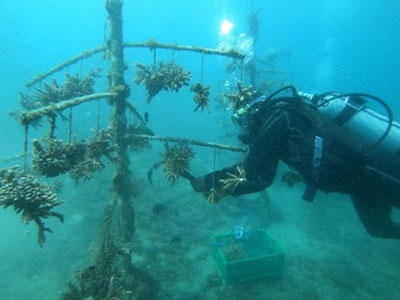
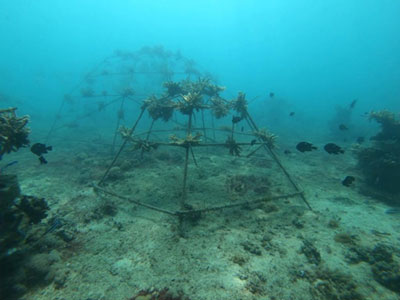 Coral reef gardening
Coral reef gardening
During my stay in Shimoni I get more and more used to diving as a research method and I am fortunate enough to learn from the Kenyan reef rangers, who use innovative methods to protect their coral reef. One of these methods is coral gardening, or ‘asexual coral propagation’. Coral fragments from colonies or wild populations which have been exposed to disturbances (storms, destructive fishing, anchoring, vessel grounding) are transported to a nursery and will grow for 6-12 months dependent on species. Once the coral fragments have grown larger in the coral nurseries, they are transplanted and outplanted onto artificial reefs. These reefs are placed when natural reefs or rocks are lacking or destroyed by human practices (REEFolution website, 2023).
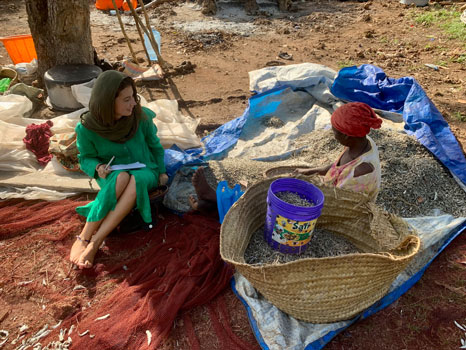 Marine masculinities
Marine masculinities
Besides diving for data, I collect my data on land trough semi-structured interviews. I mainly focus on women, since the aspect of gender is often overlooked in studies on coastal communities. The reason for that is that fisheries - the main source of income for coastal communities - are often perceived to be a male domain. Within the academic literature there is even the concept of ‘marine masculinities’, which emphasises the physical environment and the specific culture of fishing communities. This concept of marine masculinities refers to ‘a dichotomy of sexual geography’, that often considers the sea is as the domain of men, and land as the domain of women.
When I arrived in Shimoni, I observed that at first sight these ‘marine masculinities’ also play a role here. When I stroll around the jetty of Shimoni I only see fishermen, preparing their boats and fishing gear so that they can go to ‘the deep sea’. However, even though the women in Shimoni and on Wasini Island are not going out to ‘the deep sea’, they heavily depend on the coral reef for food and income. Furthermore, women have an important role as processors of fish and fish selling. Hence, they can provide more information about the availability and size of species, but also about the disappearance of species, and therefore the condition of the coral reef.
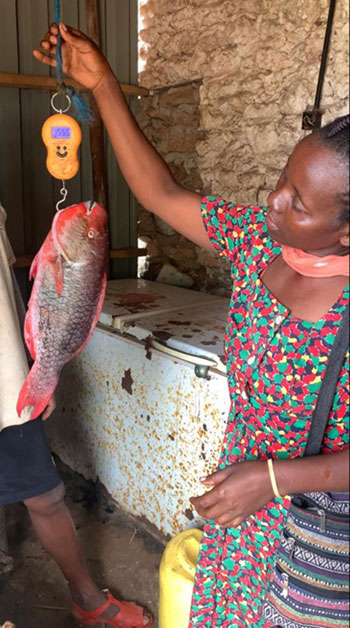
Female fish sellers
I therefore wanted to speak to a variety of female stakeholders who are directly or indirectly related to the coral reef, and try to capture how women perceive threats to the coral reef, how they relate to the reef and what role they play. So, I interviewed women who catch octopus and collect shells from the shore, female fish sellers (also known as mama Karanga in Kiswahili), women who are part of the Beach Management Unit and female reef rangers.
One of the biggest threats to coral reef is the rising sea temperature caused by climate change. I was wondering how the women in Shimoni and on Wasini Island perceive this threat. It appeared that my interviewees did not perceive climate change per se as a global threat, but rather as seasonal changes. Especially the change of the monsoon winds, also known as Kaskazi and Kusi in Kiswahili, were mentioned often in conversations about climate change. My interviewees taught me that Kaskazi and Kusi influence the ocean, fishing activities and the coral reef. For instance, during Kaskazi corals break off due to the large swell.
When I conduct my interviews, I work together with Omar, who is my translator but also has become a good friend. I speak and understand a little Kiswahili, but unfortunately I do not know it well enough to conduct entire interviews in Kiswahili. Yet, when I try to start a conversation in Kiswahili or when I use the Islamic greeting As-saluma alykum, people appreciate it that I try to speak their language.
Worth the wait
What is probably the best part of doing ethnographic research is that I am actually ‘in the field’: I am able to go outside, interact, and connect with my interviewees and the reef while I do my research. I appreciate my stay in Kenya even more since I chose to postpone my fieldwork for one year, because of travel restrictions due to the COVID-19 pandemic. It was definitely worth the wait, because in the past six months I have learned so much about reef restoration and the coastal Swahili culture, thanks to all the interesting meetings I have had with the women in Shimoni and on Wasini Island. All this wouldn’t have been possible from a distance.
Would you like to stay updated on new blog posts in the ASCL Africanist Blog? Subscribe here! Would you like to comment? Please do! The ASCL reserves the right to edit, shorten or reject submitted comments.
Photo credits
Header photo (group) by Dzivula Gube
Upper left photo (Indy diving) by Bulisa Masiga
Upper right photo (coral) by Indy Koster
Two photos left (coral nursery, and outplanting onto artificial reef) by Indy Koster
Lower right photo (Indy interviewing a fish seller) by Omar Salim
Lower left photo (woman weighing a fish) by Indy Koster


Add new comment